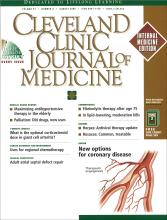Table of Contents
From the Editor
- Louisa Paskert, aide to five CCJM editors, to retire after 34 years
As our editorial assistant, Louisa contributesto every aspect of the Journal.
1-Minute Consult
- What is the appropriate initial dose of corticosteroids to treat giant cell arteritis?
A lower dose than traditionally used may be enough to control symptoms and prevent blindness while minimizing adverse effects.
Medical Grand Rounds
- Maximizing antihypertensive management in the elderly
A checklist of specific considerations when treating hypertension in the elderly.
- Palliative medicine: Old dogs and new tricks
Some older drugs can be used for off-label indications, to either substitute for or augment the palliative action of approved drugs.
Review
- Update on antiviral therapy for genital herpes infection
After a first episode, should one give continuous prophylactic treatment or treat recurrences as they arise?
Commentary
- Fibrinolytic therapy in the elderly: Making sense of troubling new findings
Do patients older than 75 years with acute MI benefit from fibrinolytic therapy? For now, we have to live with uncertainty.
Review
- New options for untreatable coronary artery disease: Angiogenesis and laser revascularization
Angiogenesis and laser revascularization may help the growing group of patients who have run out of other options.
Cancer Diagnosis and Management
- Regional delivery of anticancer drugs: Current applications
For some cancers, an option is to deliver anticancer drugs directly to the involved region.
Review
- Rosacea: An update
Early diagnosis and thoughtful management help control the disease and minimize discomfort and emotional distress.
Clinical Perspective
- Long-term outcomes excellent for atrial septal defect repair in adults
It’s never too late, generally, to patch a hole in the heart, as shown by 25-year follow-up data.





Commentary
The author’s experience indicates that a low-fat, plant-based diet can lower cholesterol to less than 150 mg/dL and reverse coronary artery disease.
Two physicians who successfully motivated their patients to make lifestyle changes were true believers.